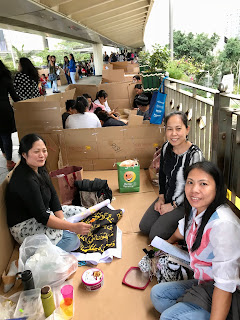Hong Kong's courageous 'Helpers'
 |
| Click image for greater clarity |
I have just returned this morning from a week's holiday in Hong Kong, and I feel very jet-lagged. But before I rest I need to try to make sense of an experience I stumbled on en route to the airport yesterday.
I hadn't visited HK before and knew nothing in advance about the elevated covered walkways that transect the inner-city. But during the week I had used them a lot, appreciating their shade and even the occasional breeze which managed to slither in between the skyscrapers. I was very used to their orderly, task-focused foot traffic too. So yesterday I was in for a shock. The foot traffic was still there, but squeezed to the centre of the path. And firmly ensconced along the perimeter fences were hundreds of Filipino women - in cardboard boxes.
My first thought was that they were protesting. And as I had discovered nearby, the previous day, a shrine to HK's 'Comfort Women' (locals used as sex slaves by Japanese troops during WW2, who still await justice) I wondered if the protest was on their behalf.
 |
| Click image for greater clarity |
But as there were no placards, banners or megaphones, I quickly dismissed that idea.
Anyhow the women seemed oblivious to the outside world, absorbed as they were in the activities in their pods. They were sewing or knitting, eating or drinking or playing cards. There was a lot of talking, laughter and some tears. Some women were asleep and others were doing each other's hair or nails.
 |
| Click image for greater clarity |
I had no idea what was happening. Next I wondered if it was a homeless encampment. But that seemed unlikely because of the temporary nature of the space's availability. Also the women had no large personal belongings with them. And I was puzzled by the cardboard boxes.
 |
| Click image for greater clarity |
At first I thought the boxes looked like cages. But after a while they appeared cosy and enclosed - temporary tiny houses. The shoes left outside many of the 'doors' enhanced that image.
I was very keen to know what was going on. It felt important. But at the same time, clearly I didn't belong, and I didn't want to intrude. So it was only when 'Mara' caught my eye and beckoned me over that I was finally enlightened.
 |
| Click image for greater clarity |
I don't speak Tagalog, and although Mara (back right) had some English, communication was by no means easy. Nevertheless, Mara was able to explain that all the women on this particular walkway are from the Phillipines. Every Sunday, all over HK, women like her and her friends, who can't afford cafes or movies, meet in public places - walkways or parks or occasionally Church halls.
As to my question about the cardboard, Mara said it provides cheap ($1 - $2 per box) shelter and privacy and protection from dirty floors. It is also more 'homely'. I really appreciated our conversation and the women's generosity in spending part of their single day off in my company. I knew it was time to move on though, when misunderstanding my question: 'Do you all work with families here?' as: 'Do you all have your families here?' the friends went quiet. Mara finally replied softly: 'No. All our families are in the Phillipines.'
During the week prior I had noticed many 'helpers' (the term used in HK for domestic labourers) most often with pre-schoolers.
 | |||
| Click image for greater clarity |
 |
| Click image for greater clarity |
 |
| Click image for greater clarity |
No matter how much they grow to love their tiny charges, it must be just about intolerable for the helpers to leave their own children behind in the Fillipines (or Indonesia or elsewhere). Mara was clear that tripling her salary has made the sacrifice worthwhile - as it ensures her children's education.
But I was left in awe of these working women's courage. And their ingenuity in providing each other with needed support, while simultaneously keeping their sense of community alive.
Now I'm off to bed!


4 Comments:
Cardboard boxes. Brilliant! Ask the cats, the toddlers. Ask Kobo Abe (Box Man). Looks much better than a crappy restaurant... Great little big story Sue
Oh Sue, what a great story. I never cease to be amazed at how families around the world struggle to survive like this. Thank you for your blog. Cathie
Great post. Hong Kong is an amazing place, but it has a dark side. Apart from the sad story of the 'helpers', HK's poor social services mean that many elderly citizens have to return to work to make ends meet (see the ABC online report on the 'cardboard nannies').
Thanks so much for your feedback and your interesting additions. I will certainly check out Kobo Abe and the 'cardboard nannies'. Yes, I do agree Hong Kong is amazing, and it does have a shadow side that as an outsider you only just glimpses.
Post a Comment
<< Home